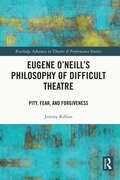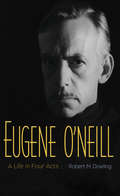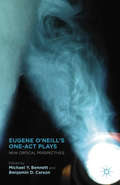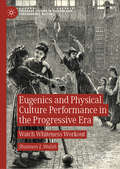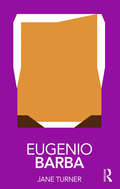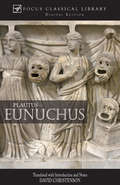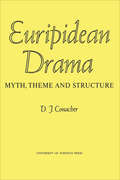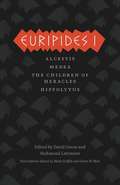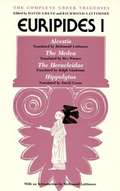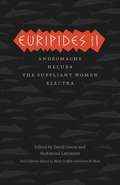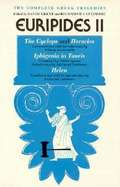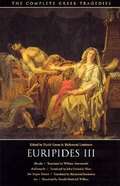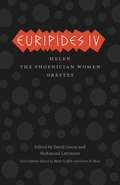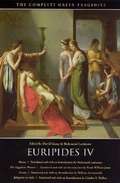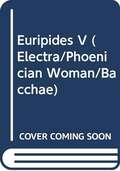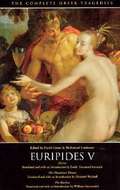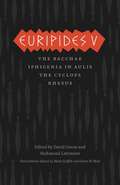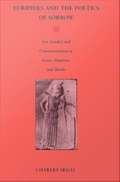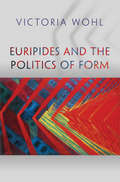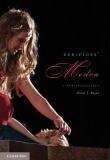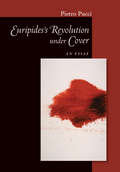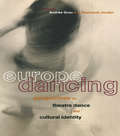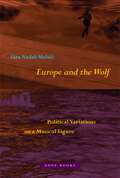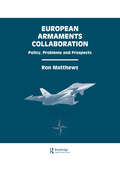- Table View
- List View
Eugene O'Neill's Philosophy of Difficult Theatre: Pity, Fear, and Forgiveness (Routledge Advances in Theatre & Performance Studies)
by Jeremy KillianThrough a close re-examination of Eugene O’Neill’s oeuvre, from minor plays to his Pulitzer-winning works, this study proposes that O’Neill’s vision of tragedy privileges a particular emotional response over a more “rational” one among his audience members. In addition to offering a new paradigm through which to interpret O’Neill’s work, this book argues that O’Neill’s theory of tragedy is a robust account of the value of difficult theatre as a whole, with more explanatory scope and power than its cognitivist counterparts. This paradigm reshapes our understanding of live theatrical tragedy’s impact and significance for our lives. The book enters the discussion of tragic value by way of the plays of Eugene O’Neill, and through this study, Killian makes the case that O’Neill has refused to allow Plato to define the terms of tragedy’s merit, as the cognitivists have. He argues that O’Neill’s theory of tragedy is non-cognitive and locates the value of a play in its ability to trigger certain emotional responses from the audience. This would be of great interest to students and scholars of performance studies, literature and philosophy.
Eugene O'Neill's The Iceman Cometh (Modern Critical Interpretations)
by Harold BloomLiterary interpretation in the form of critical essays on the Iceman Cometh.
Eugene O'Neill: A Life in Four Acts (American Critical Archives Ser.)
by Robert M. DowlingAn &“absorbing&” biography of the playwright and Nobel laureate that &“unflinchingly explores the darkness that dominated O&’Neill&’s life&” (Publishers Weekly). This extraordinary biography fully captures the intimacies of Eugene O&’Neill&’s tumultuous life and the profound impact of his work on American drama, innovatively highlighting how the stories he told for the stage interweave with his actual life stories as well as the culture and history of his time. Much is new in this extensively researched book: connections between O&’Neill&’s plays and his political and philosophical worldview; insights into his Irish American upbringing and lifelong torment over losing faith in God; his vital role in African American cultural history; unpublished photographs, including a unique offstage picture of him with his lover Louise Bryant; new evidence of O&’Neill&’s desire to become a novelist and what this reveals about his unique dramatic voice; and a startling revelation about the release of Long Day&’s Journey Into Night in defiance of his explicit instructions. This biography is also the first to discuss O&’Neill&’s lost play Exorcism (a single copy of which was only recently recovered), a dramatization of his own suicide attempt. Written with both a lively informality and a scholar&’s strict accuracy, Eugene O&’Neill: A Life in Four Acts is a biography worthy of America&’s foremost playwright. &“Fast-paced, highly readable . . . building to a devastating last act.&” —Irish Times
Eugene O’Neill’s One-Act Plays
by Michael Y. BennettGives long overdue attention to O'Neill's one-acts, this edited collection offers a variety of lenses through which to better understand both his one-act plays and entire oeuvre.
Eugenics and Physical Culture Performance in the Progressive Era: Watch Whiteness Workout (Palgrave Studies in Theatre and Performance History)
by Shannon L. WalshThis book strives to unmask the racial inequity at the root of the emergence of modern physical culture systems in the US Progressive Era (1890s–1920s). This book focuses on physical culture – systematic, non-competitive exercise performed under the direction of an expert – because tracing how people practiced physical culture in the Progressive Era, especially middle- and upper-class white women, reveals how modes of popular performance, institutional regulation, and ideologies of individualism and motherhood combined to sublimate whiteness beneath the veneer of liberal progressivism and reform. The sites in this book give the fullest picture of the different strata of physical culture for white women during that time and demonstrate the unracialization of whiteness through physical culture practices. By illuminating the ways in which whiteness in the US became a default identity category absorbed into the “universal” ideals of culture, arts, and sciences, the author shows how physical culture circulated as a popular performance form with its own conventions, audience, and promised profitability. Finally, the chapters reveal troubling connections between the daily habits physical culturists promoted and the eugenics movement’s drive towards more reproductively efficient white bodies. By examining these written, visual, and embodied texts, the author insists on a closer scrutiny of the implicit whiteness of physical culture and forwards it as a crucial site of analysis for performance scholars interested in how corporeality is marshaled by and able to contest local and global systems of power.
Eugenio Barba (Routledge Performance Practitioners)
by Jane TurnerEugenio Barba is recognized as one of the most important theatre practitioners working today. Along with the company he founded over fifty years ago, the world-acclaimed Odin Teatret, he continues to produce extraordinary theatre performances that tour the world, and his International School of Theatre Anthropology has greatly developed research into the craft of the actor. Now revised and updated, this volume reveals the background to and work of a major influence on twentieth- and twenty-first century performance. Eugenio Barba is the first book to combine: an overview of Barba’s work and that of his company, Odin Teatret exploration of his writings and ideas on theatre anthropology, and his unique contribution to contemporary performance research in-depth analysis of the 2000 production of Ego Faust, performed at the International School of Theatre Anthropology a practical guide to training exercises developed by Barba and the actors in the company. As a first step towards critical understanding, and as an initial exploration before going on to further, primary research, Routledge Performance Practitioners offer unbeatable value for today’s student.
Eunuchus: The Eunuch
by Terence David ChristensonThe play Eunuchus provides an introduction to the world of Roman comedy from one of its best practitioners, Terence. As with all Focus translations, the emphasis is on an inexpensive, readable edition that is close to the original, with an extensive introduction, notes and appendices.
Euripidean Drama: Myth, Theme and Structure
by Desmond ConacherIt is a commonly held view among historians of Greek literature that with the advent of Euripides the tragic structure, even the tragic outlook of Greek drama suffered a breakdown from which it never recovered. While there is much truth in this opinion, it has tended to put too much emphasis on "Euripides the destroyer" rather than "Euripides the creator." In this study the author's main purpose is to redress the balance and to discuss the structure and techniques of Euripidean drama in relation to its new and richly varied themes.The consistent dramatic form evolved by Aeschylus and Sophocles had grown out of their conception of tragedy as the resultant of the tension between the individual will and the universal order suggested in myth. For Euripides, who never fully accepted myth as the real basis of tragedy, alternate ways of using the traditional material became necessary, and the playwright continually changed his dramatic structure to suit the particular tragic idea he was seeking to express. Viewed in this way, Euripides' dramatic technique may be seen in positive as well as negative terms—as something other than the breakdown of structural technique and mythological insight under the overwhelming force of his ideas. Professor Conacher offers here a new view of Euripides as the first Greek dramatist properly to understand the world of myth, and so, in a sense, to stand a bit outside it. He shows how Euripides, far from being an impatient or incompetent craftsman, used traditional mth as a basis for inventing new forms in which to cast his perceptions of the sources of human tragedy. All the extant Euripidean drama is examined in this book; the result is an intelligent guide to the plays for all students of dramatic literature, as well as a convincing defence of Euripides the creator.
Euripides I
by David Grene Euripides Richmond Lattimore Glenn W. Most Mark GriffithEuripides I contains the plays "Alcestis," translated by Richmond Lattimore; "Medea," translated by Oliver Taplin; "The Children of Heracles," translated by Mark Griffith; and "Hippolytus," translated by David Grene. Sixty years ago, the University of Chicago Press undertook a momentous project: a new translation of the Greek tragedies that would be the ultimate resource for teachers, students, and readers. They succeeded. Under the expert management of eminent classicists David Grene and Richmond Lattimore, those translations combined accuracy, poetic immediacy, and clarity of presentation to render the surviving masterpieces of Aeschylus, Sophocles, and Euripides in an English so lively and compelling that they remain the standard translations. Today, Chicago is taking pains to ensure that our Greek tragedies remain the leading English-language versions throughout the twenty-first century. In this highly anticipated third edition, Mark Griffith and Glenn W. Most have carefully updated the translations to bring them even closer to the ancient Greek while retaining the vibrancy for which our English versions are famous. This edition also includes brand-new translations of Euripides' Medea, The Children of Heracles, Andromache, and Iphigenia among the Taurians, fragments of lost plays by Aeschylus, and the surviving portion of Sophocles's satyr-drama The Trackers. New introductions for each play offer essential information about its first production, plot, and reception in antiquity and beyond. In addition, each volume includes an introduction to the life and work of its tragedian, as well as notes addressing textual uncertainties and a glossary of names and places mentioned in the plays. In addition to the new content, the volumes have been reorganized both within and between volumes to reflect the most up-to-date scholarship on the order in which the plays were originally written. The result is a set of handsome paperbacks destined to introduce new generations of readers to these foundational works of Western drama, art, and life.
Euripides I: Alcestis, The Medea, The Heracleidae, Hippolytus (The Complete Greek Tragedies #3)
by David Grene Euripides Rex Warner Ralph Gladstone Richmond LattimoreVolume 3 of the Grene and Lattimore editions, which offer the most comprehensive selection of the Greek tragedies available in English.
Euripides II
by David Grene Euripides Richmond Lattimore Glenn W. Most Mark GriffithEuripides II contains the plays "Andromache," translated by Deborah Roberts; "Hecuba," translated by William Arrowsmith; "The Suppliant Women," translated by Frank William Jones; and "Electra," translated by Emily Townsend Vermeule. Sixty years ago, the University of Chicago Press undertook a momentous project: a new translation of the Greek tragedies that would be the ultimate resource for teachers, students, and readers. They succeeded. Under the expert management of eminent classicists David Grene and Richmond Lattimore, those translations combined accuracy, poetic immediacy, and clarity of presentation to render the surviving masterpieces of Aeschylus, Sophocles, and Euripides in an English so lively and compelling that they remain the standard translations. Today, Chicago is taking pains to ensure that our Greek tragedies remain the leading English-language versions throughout the twenty-first century. In this highly anticipated third edition, Mark Griffith and Glenn W. Most have carefully updated the translations to bring them even closer to the ancient Greek while retaining the vibrancy for which our English versions are famous. This edition also includes brand-new translations of Euripides' Medea, The Children of Heracles, Andromache, and Iphigenia among the Taurians, fragments of lost plays by Aeschylus, and the surviving portion of Sophocles's satyr-drama The Trackers. New introductions for each play offer essential information about its first production, plot, and reception in antiquity and beyond. In addition, each volume includes an introduction to the life and work of its tragedian, as well as notes addressing textual uncertainties and a glossary of names and places mentioned in the plays. In addition to the new content, the volumes have been reorganized both within and between volumes to reflect the most up-to-date scholarship on the order in which the plays were originally written. The result is a set of handsome paperbacks destined to introduce new generations of readers to these foundational works of Western drama, art, and life.
Euripides II: The Cyclops, Heracles, Iphigenia in Tauris, Helen (The Complete Greek Tragedies #4)
by David Grene Euripides Richmond LattimoreVolume 2 of the Grene and Lattimore editions offers the most comprehensive selection of the Greek tragedies available in English comprising The Cyclops, Heracles, Iphigenia in Tauris, and Helen.
Euripides III: Hecuba, Andromache, The Trojan Women, Ion (The Complete Greek Tragedies #5)
by David Grene Euripides Richmond LattimoreVolume 3 of the Grene and Lattimore editions offers the most comprehensive selection of the Greek tragedies available in English comprising Hecuba, Andromache, The Trojan Women, and Ion.
Euripides IV
by David Grene Euripides Richmond Lattimore Glenn W. Most Mark GriffithEuripides IV contains the plays "Helen," translated by Richmond Lattimore; "The Phoenician Women," translated by Elizabeth Wyckoff; and "Orestes," translated by William Arrowsmith. Sixty years ago, the University of Chicago Press undertook a momentous project: a new translation of the Greek tragedies that would be the ultimate resource for teachers, students, and readers. They succeeded. Under the expert management of eminent classicists David Grene and Richmond Lattimore, those translations combined accuracy, poetic immediacy, and clarity of presentation to render the surviving masterpieces of Aeschylus, Sophocles, and Euripides in an English so lively and compelling that they remain the standard translations. Today, Chicago is taking pains to ensure that our Greek tragedies remain the leading English-language versions throughout the twenty-first century. In this highly anticipated third edition, Mark Griffith and Glenn W. Most have carefully updated the translations to bring them even closer to the ancient Greek while retaining the vibrancy for which our English versions are famous. This edition also includes brand-new translations of Euripides' Medea, The Children of Heracles, Andromache, and Iphigenia among the Taurians, fragments of lost plays by Aeschylus, and the surviving portion of Sophocles's satyr-drama The Trackers. New introductions for each play offer essential information about its first production, plot, and reception in antiquity and beyond. In addition, each volume includes an introduction to the life and work of its tragedian, as well as notes addressing textual uncertainties and a glossary of names and places mentioned in the plays. In addition to the new content, the volumes have been reorganized both within and between volumes to reflect the most up-to-date scholarship on the order in which the plays were originally written. The result is a set of handsome paperbacks destined to introduce new generations of readers to these foundational works of Western drama, art, and life.
Euripides IV: Rhesus, The Suppliant Women, Orestes, Iphigenia in Aulis (The Complete Greek Tragedies #6)
by David Grene Euripides Richmond LattimoreVolume 4 of the Grene and Lattimore editions offers the most comprehensive selection of the Greek tragedies available in English comprising Rhesus, The Suppliant Women, Orestes, and Iphigenia in Aulis.
Euripides V (Electra/Phoenician Woman/Bacchae)
by Richmond Lattimore David GreneA Softcover- Pages are clean. Binding is tight. Cover has minimal shelf wear. Back cover has some corner crease. If you are not totally satisfied please return item for a full refund. Please send me a e-mail before leaving me a bad feedback so it can be resolved. We do our best to accurately describe the condition of items that we sell, but we are not the original owners of our items and we are not able to inspect every page so we may miss something. Older items tend to have some degree of tanning and if we state that an item is an ex-library copy, expect the normal stamps and stickers that are typical for those items. These are all used items unless otherwise specified and although we find items that look new, the majority have been used. So, expect some wear/creasing from normal use. We always ship your package in a timely manner. Unfortunately we have no control over carrier shipping time. Our goal is your 5 star feedback and we will do everything we can to ensure you are happy with your purchase.
Euripides V: Electra, The Phoenician Women, The Bacchae (The Complete Greek Tragedies #7)
by David Grene Euripides Richmond LattimoreIn nine paperback volumes, the Grene and Lattimore editions offer the most comprehensive selection of the Greek tragedies available in English. Over the years these authoritative, critically acclaimed editions have been the preferred choice of over three million readers for personal libraries and individual study as well as for classroom use.
Euripides V: The Complete Greek Tragedies, Third Edition
by David Grene Richmond Lattimore"Euripides V" includes the plays The Bacchae, translated by William Arrowsmith; Iphigenia in Aulis, translated by Charles R. Walker; The Cyclops, translated by William Arrowsmith; and Rhesus, translated by Richmond Lattimore. Sixty years ago, the University of Chicago Press undertook a momentous project: a new translation of the Greek tragedies that would be the ultimate resource for teachers, students, and readers. They succeeded. Under the expert management of eminent classicists David Grene and Richmond Lattimore, those translations combined accuracy, poetic immediacy, and clarity of presentation to render the surviving masterpieces of Aeschylus, Sophocles, and Euripides in an English so lively and compelling that they remain the standard translations. Today, Chicago is taking pains to ensure that our Greek tragedies remain the leading English-language versions throughout the twenty-first century. In this highly anticipated third edition, Mark Griffith and Glenn W. Most have carefully updated the translations to bring them even closer to the ancient Greek while retaining the vibrancy for which our English versions are famous. This edition also includes brand-new translations of Euripides "Medea," "The Children of Heracles," "Andromache," and "Iphigenia among the Taurians," fragments of lost plays by Aeschylus, and the surviving portion of Sophocles s satyr-drama "The Trackers. " New introductions for each play offer essential information about its first production, plot, and reception in antiquity and beyond. In addition, each volume includes an introduction to the life and work of its tragedian, as well as notes addressing textual uncertainties and a glossary of names and places mentioned in the plays. In addition to the new content, the volumes have been reorganized both within and between volumes to reflect the most up-to-date scholarship on the order in which the plays were originally written. The result is a set of handsome paperbacks destined to introduce new generations of readers to these foundational works of Western drama, art, and life. "
Euripides and the Poetics of Sorrow: Art, Gender, and Commemoration in Alcestis, Hippolytus, and Hecuba
by Charles SegalWhere is the pleasure in tragedy? This question, how suffering and sorrow become the stuff of aesthetic delight, is at the center of Charles Segal's new book, which collects and expands his recent explorations of Euripides' art. Alcestis, Hippolytus, and Hecuba, the three early plays interpreted here, are linked by common themes of violence, death, lamentation and mourning, and by their implicit definitions of male and female roles. Segal shows how these plays draw on ancient traditions of poetic and ritual commemoration, particularly epic song, and at the same time refashion these traditions into new forms. In place of the epic muse of martial glory, Euripides, Segal argues, evokes a muse of sorrows who transforms the suffering of individuals into a "common grief for all the citizens," a community of shared feeling in the theater. Like his predecessors in tragedy, Euripides believes death, more than any other event, exposes the deepest truth of human nature. Segal examines the revealing final moments in Alcestis, Hippolytus, and Hecuba, and discusses the playwright's use of these deaths--especially those of women--to question traditional values and the familiar definitions of male heroism. Focusing on gender, the affective dimension of tragedy, and ritual mourning and commemoration, Segal develops and extends his earlier work on Greek drama. The result deepens our understanding of Euripides' art and of tragedy itself.
Euripides and the Politics of Form
by Victoria WohlHow can we make sense of the innovative structure of Euripidean drama? And what political role did tragedy play in the democracy of classical Athens? These questions are usually considered to be mutually exclusive, but this book shows that they can only be properly answered together. Providing a new approach to the aesthetics and politics of Greek tragedy, Victoria Wohl argues that the poetic form of Euripides' drama constitutes a mode of political thought. Through readings of select plays, she explores the politics of Euripides' radical aesthetics, showing how formal innovation generates political passions with real-world consequences. Euripides' plays have long perplexed readers. With their disjointed plots, comic touches, and frequent happy endings, they seem to stretch the boundaries of tragedy. But the plays' formal traits--from their exorbitantly beautiful lyrics to their arousal and resolution of suspense--shape the audience's political sensibilities and ideological attachments. Engendering civic passions, the plays enact as well as express political ideas. Wohl draws out the political implications of Euripidean aesthetics by exploring such topics as narrative and ideological desire, the politics of pathos, realism and its utopian possibilities, the logic of political allegory, and tragedy's relation to its historical moment.Breaking through the impasse between formalist and historicist interpretations of Greek tragedy, Euripides and the Politics of Form demonstrates that aesthetic structure and political meaning are mutually implicated--and that to read the plays poetically is necessarily to read them politically.
Euripides' Medea
by Diane J. RayorEuripides' Medea comes alive in this new translation that will be useful for both academic study and stage production. Diane J. Rayor's accurate yet accessible translation reflects the play's inherent theatricality and vibrant poetry. The book includes an analytical introduction and comprehensive notes, and an essay on directing Medea by stage director Karen Libman. The play begins after Medea, a princess in her own land, has sacrificed everything for Jason: she helped him in his quest for the Golden Fleece, eloped with him to Greece, and bore him sons. When Jason breaks his oath to her and betrays her by marrying the king's daughter – his ticket to the throne – Medea contemplates the ultimate retribution. What happens when words deceive and those you trust most do not mean what they say? Euripides' most enduring Greek tragedy is a fascinating and disturbing story of how far a woman will go to take revenge in a man's world.
Euripides’ Revolution under Cover: An Essay (Cornell Studies in Classical Philology #65)
by Pietro PucciIn this provocative book, Pietro Pucci explores what he sees as Euripides's revolutionary literary art. While scholars have long pointed to subversive elements in Euripides’s plays, Pucci goes a step further in identifying a Euripidean program of enlightened thought enacted through carefully wrought textual strategies. The driving force behind this program is Euripides’s desire to subvert the traditional anthropomorphic view of the Greek gods—a belief system that in his view strips human beings of their independence and ability to act wisely and justly. Instead of fatuous religious beliefs, Athenians need the wisdom and the strength to navigate the challenges and difficulties of life.Throughout his lifetime, Euripides found himself the target of intense criticism and ridicule. He was accused of promoting new ideas that were considered destructive. Like his contemporary, Socrates, he was considered a corrupting influence. No wonder, then, that Euripides had to carry out his revolution "under cover." Pucci lays out the various ways the playwright skillfully inserted his philosophical principles into the text through innovative strategies of plot development, language and composition, and production techniques that subverted the traditionally staged anthropomorphic gods.
Europe Dancing: Perspectives on Theatre, Dance, and Cultural Identity
by Andree Grau Stephanie JordanEurope Dancing examines the dance cultures and movements which have developed in Europe since the Second World War. Nine countries are represented in this unique collaboration between European dance scholars. The contributors chart the art form, and discuss the outside influences which have shaped it. This comprehensive book explores: * questions of identity within individual countries, within Europe, and in relation to the USA * the East/West cultural division * the development of state subsidy for dance * the rise of contemporary dance as an 'alternative' genre * the implications for dance of political, economic and social change. Useful historical charts are included to trace significant dance and political events throughout the twentieth century in each country. Never before has this information been gathered together in one place. This book is essential reading for everyone interested in dance and its growth and development in recent years.
Europe and the Wolf: Political Variations on a Musical Figure
by Sara Nadal-MelsióHow the work of several contemporary artists illuminates and challenges the policing of European borders and identityIn this stunningly original book, Sara Nadal-Melsió explores how the work of several contemporary artists illuminates the current crisis of European universalist values amid the brutal realities of exclusion and policing of borders. The &“wolf&” is the name Baroque musicians gave to the dissonant sound produced in any attempt to temper and harmonize an instrument. Europe and the Wolf brings this musical figure to bear on contemporary aesthetic practices that respond to Europe&’s ongoing social and political contradictions. Throughout, Nadal-Melsió understands Europe as a conceptual problem that often relies on harmonization as an organizing category. The &“wolf&” as an emblem of disharmony, incarnated in the stranger, the immigrant, or the refugee, originates in the Latin proverb &“man is a wolf to man.&” This longstanding phrase evokes the pervasive fear, and even hatred, of what is foreign, unknown, or beyond the borders of a community. The book follows the &“wolf&” in a series of relays between the musical, the visual, and the political, and through innovative readings of artworks—by, among others, Carles Santos, Pere Portabella, Allora&Calzadilla, and Anri Sala. Traversed by the musical, these artworks, as well as Nadal-Melsió&’s writing, present unstable symbolic and material ensembles in an array of variations of political possibilities and impossibilities that evade institutions intolerant of uncertainty and wary of diversity.
European Armaments Collaboration: European Armaments Collaboration: Policy Problems And Prospects (Routledge Studies in Defence and Peace Economics #1)
by Ron MatthewsFirst published in 1992. The changing strategic environment of the 1990s has been characterised by events such as the Middle-East conflagration and super-power disarmament which represent the two opposing ends of the present security spectrum. The framing of appropriate defence policies now depends on increased NATO industrial defence restructuring and cooperation, especially within Europe. This book identifies, explains and analyses the key issues involved in Europe's defence-industrial reorganisation progress. It tackles head-on controversial issues such as: divergences between practice and policy in NATO US-European positions; the high costs of collaborative ventures; competition vs concentration and the complexities of adopting an European defence consensus within NATO. At a time when the diminution of NATO's defence-industrial base goes hand-in-hand with product reorientation and specialization, this book provides concise, critical and contemporary assessment of European and NA TO collaborative issues.
